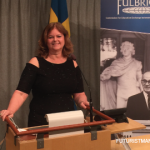Maura D. Iversen, PT, DPT, SD, MPH, of MGH Institute of Health Professions in Boston, will discuss the nonsurgical management of lumbar spinal stenosis (LSS), epidemiology, and common symptoms associated with this condition during the ARHP rheumatology audioconference on Wednesday, May 21, from noon to 1:00 p.m. (EST). Iversen will provide a summary of nonpharmacologic and nonsurgical interventions to manage LSS—including a summary and evaluation of manual therapy techniques and exercise.
Iversen began her career as a physical therapist for inpatient and outpatient physical therapy. She then worked as a clinical specialist in the spine clinic at Brigham and Women’s Hospital. This work corresponded with her enrollment in the doctoral program at Harvard University.
Due to Iversen’s interest in identifying interventions that are effective, acceptable, and safe for older adults with LSS, she chose this condition as an area of focus for her dissertation. Specifically, Iversen examined the influence of patient expectations of surgery for LSS on self-reported pain and function.
Following the completion of her doctoral studies, Iversen’s postdoctoral work focused on the evaluation of an aerobic exercise program for patients with LSS. The genesis for this idea was patients’ difficulties with exercise programs and physical activity due to symptoms being exacerbated by walking and relieved by back bending. In her study, Iversen discovered that most patients tended to limit their walking and suffered the consequences of deconditioning as well as weakness, pain, and reduced aerobic capacity, which are a direct consequence of the disease.
Data shows that 40% of older people with low back pain report restrictions in activities of daily living. LSS is one of many degenerative conditions of the lumbar spine, which are typically associated with symptoms that are relieved with flexion of the spine and exacerbated with extension or walking. Therefore, without the proper exercise program, these patients are at higher risk of suffering the consequences of deconditioning.
Iversen believes it is important for health professionals to understand LSS, because chronic low back pain afflicts 20% of people older than 65, limiting their independence and ultimately reducing quality of life.
To sign up for the for the May 21 audioconference, visit www.rheumatology.org/arhp or contact Sharon Ross at (404) 633-3777, ext. 802. CME and certificates of participation will be offered to paid registrants. If you are unable to participate, you can purchase a recording on the ARHP Web site.
